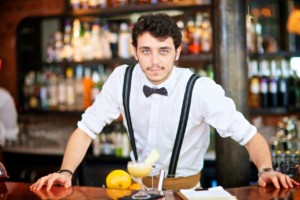Harness the Ambition of the “Celebrity Bartender” to Sell More
The Booze Business Blog published a recent post discussing the evolution of the professional bartender. Once a job not known for any significant advancement opportunity, today, bartenders are increasingly embracing the role of brand ambassador or “bar chef”, and are viewing their time behind the bar as a stepping stone to ownership and other advancement opportunities. Smart suppliers ought to be getting behind this trend, as it holds the potential to dovetail nicely with leading-edge beverage selling best practices. Here’s what I’m talking about.
Trade marketing and brand activation drives increased sales. Success in these two functions relies heavily on producing memorable brand experiences and then carefully tracking the results to optimize performance. To this end, helping support so called “cocktail culture” which is elevating the art of bartending, is a great way to take advantage of the opportunity to heighten your brand’s awareness. Allocating marketing dollars toward supporting those “bar chefs” (who typically work in upscale venues) is likely to pay dividends. And of course you’ll know if it doesn’t because tools like GreatVines help measure the returns on your trade marketing investments.
The “brand ambassador”, another potential employment upgrade for the ambitious bartender, is also a potential avenue for effective trade marketing campaigning. Booze Business’s Shapiro writes, “for the past few decades, suppliers have realized that to generate interest in their brands and products, they need to capture the hearts and minds of the key influencer and gatekeeper, the bartender.” Supporting these motivated bartenders with all the ideas, materials, recipes, and campaign support, they need to help break into more lucrative “ambassador” jobs (away from the late nights, long hours and physically demanding tasks of bartending) is a wise play. The suppliers providing this support to driven bartenders will be rewarded as their products will be vigorously promoted.
Beyond the notion of the rise of the “celebrity bartender”, there is a broader overall trend toward artisanal culinary experiences. Consumers are growing more sophisticated and interested in the provenance of the food and libations they consume. The simple “night out for dinner” is morphing into a “dining experience” where a premium is placed on hosts knowledgeable about the food and beverages they serve, and qualified to share information about the origins of it all. Once again, there is the opportunity to support the improved training of bar and restaurant staffs with respect to a supplier’s products and labels. Giving these hospitality workers better tools to deliver a more refined or at least more engaging F&B experience is sure to yield dividends when it comes to volume of sales.

